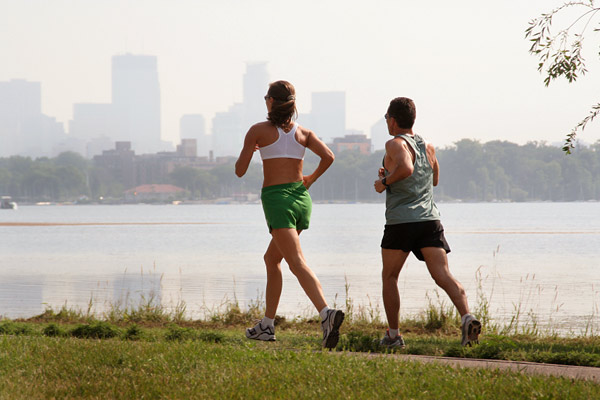There are many reasons why people of all ages, backgrounds and abilities take up running. For some it is to get fit, to improve their health, to lose weight; for others it may be to improve their self-image or simply for the fun of it.
Running For Fitness
Running is an especially efficient way to increase fitness. Very few other sports – perhaps only swimming, rowing and cross-country skiing – have such clear benefits in terms of all-round fitness.
Fitness can be measured in many different ways. There are people who can lift huge weights, but could not comfortably run a mile. Weightlifters can generate huge bursts of energy for a short period of time, using their upper body. Some marathon runners, by contrast, would have great difficulty performing simple gymnastics on parallel bars because they lack upper body strength; but they can get themselves around a 26.2-mile course with great efficiency. Both the weightlifter and the marathon runner are fit, in that they can expend energy efficiently, but they are fit in different ways.
One measure of fitness – called cardiovascular fitness – is the ability of your body to absorb oxygen and transfer it through the blood supply to the muscles. This is determined by the efficiency of your heart and lungs, and the health of your arteries; it is especially important for endurance sports like running, in which you need to be able to deliver fuel and oxygen to the muscles that do the work.
Fitness tests are generally aimed at measuring your cardiovascular fitness. The results of a fitness test will depend not only on your underlying cardiovascular fitness, but on the specific muscles you use in the test. A trained runner will generally perform better in a fitness test on a treadmill than in a fitness test on an exercise bike.
How will running make me fit?
All fitness is acquired through a process of physical stress and recovery. When you perform any type of exercise, our bodies have to perform actions that it wouldn’t normally do when you are at rest. For example, during your run, your heart rate increases, your muscles have to work more and your body’s metabolic system burns more fuel.
When you finish the exercise, your body starts to recover and adjusts its performance levels (muscles get slightly stronger, lungs improve their efficiency etc) to make sure it can accomplish these tasks a bit easier next time you do them. You need to bear in mind that your body adapts to these exercises when you are resting (or recovering), not actually during the exercise itself. This is why rest is an equally important part of any weight loss of fitness training program.
Running For Health
As well as increasing your fitness, running improves your health. Doctors say that you should exercise for thirty minutes a day for three to four days a week. This exercise should raise your heart rate to above 100 beats a minute, or to about 50-75 per cent of your maximum heart rate. Running regularly will increase your life expectancy and improve your quality of life.
Running has been shown to have the following health benefits:
- lower levels of body fat and obesity
- lower risk of heart disease and stroke
- stronger bones, reducing the risk of osteoporosis, osteoarthritis, etc.
- reduced risk of diseases such as cancer and diabetes.
- improved immune system
- stronger muscles, and less risk of degradation of joints
- reduced risk of back pain
- reduced incidence of depression and anxiety
- increased co-ordination and mobility, especially in older adults.
Physical exercise is now recognized as a major contributor to good health and an important focus for health promotion. Doctors see exercise as one of the most effective ways to improve the nation’s health.
Health means freedom from illness or injury, enabling a person to live normally and in comfort. Fitness means the ability to expend a lot of energy efficiently.
Running is one of the best and easiest exercises that anybody can do. Whether you’re going for a quick run in the park, or heading cross country, running is a great weight loss exercise.






